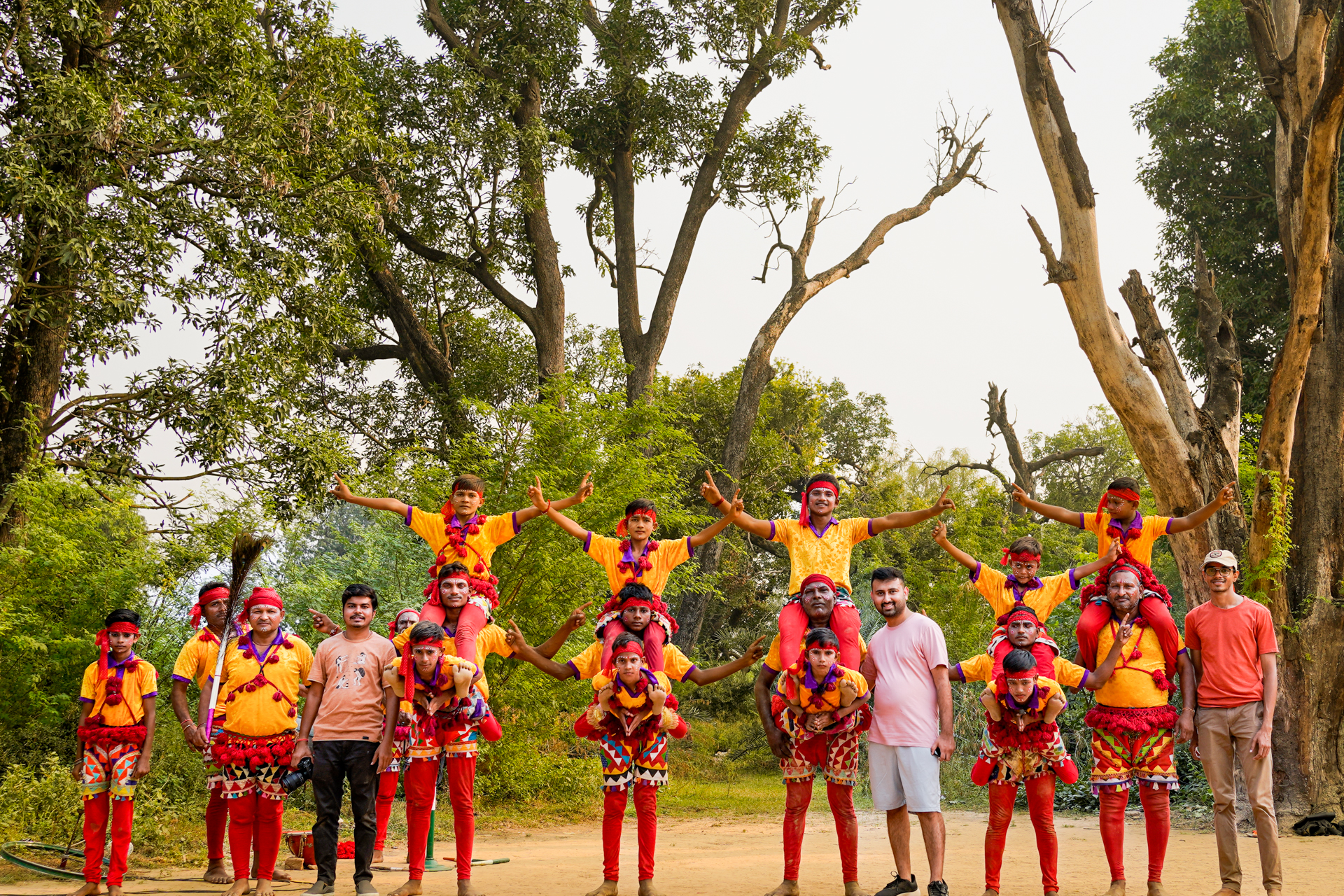
An Energetic Display of Martial Arts
Dewari Pai Danda is a martial-arts-based dance form from Bundelkhand.
For the 47-year-old resident of Banda, Uttar Pradesh, Babu Kushwaha, Diwari Pai Danda is his passion and what gives him a purpose in life. He is a hard-working man who works 12-hour shifts at a local rice mill, but he still takes time to practice the art daily. His group of performers has performed in many places, including Delhi, Kanpur, Lucknow and even in the North-East of Guwahati. Diwari Pai Danda has brought him name and fame, a fact that he profoundly cherishes and feels proud of continuing the culture and traditions he grew up in.
He comes from a family of performers of the art. His father, uncles and grandfather all practised and performed it for years. Babu also started learning it at a very young age. He was only 12 when he was already performing it alongside his father. Diwari Pai Danda is a traditional martial arts-based folk dance native to the Bundelkhand region in Uttar Pradesh. Danda refers to club sticks that serve as the ‘weapon’ for the martial arts practice the dance centres around. Performers indulge in stick-fighting, rhythmic dancing and gymnastics; all choreographed to percussion music produced by Dhol and Nagada. It could be considered a more aggressive variant of the more popular Dandia dance.
Diwari refers to the one-minute introduction sung at the beginning of the performance, after which Pai Danda, a dance involving club sticks and fighting, is performed. Pai Danda is considered a form of Yoga, where sadhana (practice) and correct form is highly important. Practising Pai Danda is believed to give the same benefits as Yoga, such as improved immunity and fitness. The principles of Yoga – both the physical asanas and the spiritual aspect of self-perfection – are found in practice. Babu triumphantly claims that nobody in his group has ever fallen sick in all these years, and even during the pandemic, they all survived it pretty healthily. He believes this is due to the healthy and energetic lifestyle Diwari Pai Danda fosters.
Traditional accounts narrate that the art form originates in the times of both the Ramayana and the Mahabharata. Diwali is celebrated to observe the return of Lord Rama to Ayodhya after vanquishing Ravana. Hence, the introductory verses to the dance, known as Diwari, usually involve the recitation of couplets (dohas) pertaining to the Ramayana. Pai Danda, which refers to the dance that follows, originates from the story of Lord Krishna lifting the Govardhan mountain to protect the villagers from the fury of Lord Indra. The villagers performed Pai Danda to entertain themselves and celebrate the victory of their Lord. The dance also fostered equality and brotherhood among the villagers, who had to share the small space under the mountain for many days.
Babu is also a former wrestler and has won many cups in matches and tournaments in his state. Likewise, he encourages other members of his group to take up athletics and gymnastics and excel in them. Although many have won in competitions, he thinks there’s a glass ceiling to their success in sports and athletics because of the village’s lack of infrastructure and opportunities. Even for Pai Danda, the group practice in the akhada, a traditional ground for practising rural martial arts, without proper safety and protection. He also points out the risks involved in performing this dance. It involves risky movements and formations, and the artists are always at risk of injury. He appeals that the government must devise a solution to ensure safety and insurance against mishaps while performing.
The akhada is located on the outskirts of Banda, inside a Hanuman Temple on a lake’s banks. The group practices there every morning, every day of the year. It begins at 5 in the morning for about two hours, and they practice without any exceptions except for the death of a villager, in which case mourning is organised instead. Members of his group come from all walks of life, with children as young as 6 to men in their middle age, like Babu himself. The performers not only aim to keep themselves physically fit and practice their form to rigorous perfection, but they also practice discipline in their everyday lives. They are learning to treat each other as brothers and become ideal members of society.
Babu considers his group to be like family, and he has supported many unemployed, dejected young boys by getting them on board. He explains that they have improved their lives because of the emotional support and a sense of direction that art form provides. Also, because the art form is being promoted by the government now, there are many performances in the year, and every member in the group manages to earn a few thousand rupees every month in them. Despite this, long-term financial prospects of performing the art still need to be improved and are hence a little discouraging for the performers.
Diwari Pai Danda is an energetic display of gymnastics and martial arts, which leaves the spectators in awe with expertly choreographed movements that are complex and in perfect coordination. The first thoughts that come to our minds upon witnessing a performance are the dedication, consistent practice and discipline required to pull it off. The dance serves as a reminder about the importance of these qualities not just in art but in all walks of life, as the key to perfection is not in-born talent but a relentless determination to achieve it no matter what it takes.
